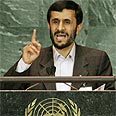
Political rookie – President Ahmadinejad
צילום: רויטרס
Analysis / What’s behind Iran remarks?
Recent anti-Israel comments may stem from weakness, aimed at internal audience, Iran expert says
Last Thursday, Iran's new president, Mahmoud Ahmadinejad, released an anti-Israel statement, saying the Jewish State should be moved to Germany or Austria.
This was not his first outburst: Ahmadinejad earlier said that Israel "should be wiped off the map," a comment that was met with sharp condemnation from the international community.
What causes these statements, and why are they being made now? It seems there is no one clear answer, even for experts such as the Head of Iranian Studies at Tel Aviv University, Professor David Menashri.
"On the face of it, it's hard to understand where these comments come from," Menashri told Ynet.
"It could be that they are motivated by a combination of strength and weakness: On the one hand, the Islamic revolution is weak, and none of its values have been preserved, other than the call to destroy Israel. On the other hand, Ahmadinejad wants to prove that he is a leader.”
“His comments are the type made by leaders who want to consolidate their authority,” Menashri says. “In general, in my opinion, these declarations have been made due to internal circumstances, a wish by Ahmadinejad to be treated as a leader in the sphere of external affairs, and not just on social affairs, on which his elections campaign was based."
Lack of experience
Ahmadinejad's rise to power came as a big surprise in Iran. It was hard to predict that the relatively obscure candidate, who was mayor of Teheran for two years, and who was known as a conservative, would be elected to a presidential term. When Ahmadinejad came to power, many around the world wondered about the new leader’s identity, a question that is now becoming easier to answer.
"In my opinion, his declarations stem from a lack of experience," Menashri says. "Ahmadinejad is convinced that he received a mandate to act on his extreme ideology, but older, more experienced leaders, such as Rafsanjani, needed over 20 years to realize that the view from the top is different.”
“In general, Ahmadinejad's comments originate from his ideological baggage, which was crystallized during the Iraq-Iran war, and they were made due to a most modest experience in politics," Menashri adds.
"Ahmadinejad was voted in due to his social pledges, and he has been perceived as a 'robin hood' type who will take from the rich and give to the poor. Now, it seems as if he has entered a playground that doesn't belong to him. Despite that, it's important to remember that he is not the deciding factor, and that spiritual leader Khamenei is at the end of the day the one who ultimately approves the president's actions.”
“Khamenei has come out against Ahmadinejad, but in general he supports his comments, albeit in a more sophisticated way. He claims a referendum should be held among the offspring of Jewish residents of Palestine who arrived here before the 1917 Balfour Declaration, and among the Palestinian residents of the same period. Since this is a tiny fraction of Jews, this would constitute the destruction of Israel, so this plan is no different in its aim," Menashri says.
'Iranian revolution has failed'
Currently, Iran is not, to put it mildly, Israel's biggest fan. The regime of the Ayatollahs distributes anti-Semitic literature around the world, denies the Holocaust, and releases statements calling for the destruction of Israel. Thus, Ahmadinejad's declarations are not a sudden departure from Iranian rhetoric, though the regime is trying to play down the president's comments against the Jewish religion.
"Anti-Jewish statements exist in Iran, but it's important for it to appear to be a country that respects other religions," Menashri adds. "After the 1979 revolution, the Jews asked the government to distinguish between Zionism and the Jews in order to avoid being harmed," he says.
How then should the latest hostility towards Jerusalem be explained? The statements mark the flexing of the president's muscles – at times, a show that stems from the Iranian revolution’s weakness – and Israel in this case is the victim "on which to take it out on."
Menashri concludes: "This is a revolution that has failed, and it's good for it to have a distant enemy to focus its attention on. Hence, the revolution boosts its prestige by showing how Israel and America are frightened of it. In fact, Israel is used as the revolution’s reason for living."










